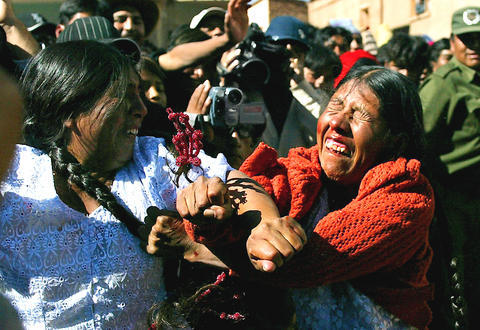The locals come down from the mountains drunk, dancing and ready to fight. The police come to make sure no one dies. And the tourists, reporters and documentary filmmakers come for the blood.
The outside world has discovered "Tinku," or "encounter" in Quechua, an ancient ritual in which indigenous Quechua communities gather each year in a remote corner of the Bolivian Andes to dance, sing and settle old scores in staggering street fights.
The largest Tinku takes place early each May in Macha, 340km southeast of La Paz, where this year's festival provided a stunning and sometimes uneasy combination of culture, spectacle and violence.

PHOTO: AP
Relatively unknown outside the Andes for centuries, Tinku remains on the fringe of Bolivia's growing tourism industry.
But its heavily asterisked listing in the guidebooks -- Lonely Planet calls it "a violent and often grisly spectacle" -- is beginning to draw both backpackers and members of the media curious to witness the peculiar event firsthand.
The attention has not gone unnoticed by the locals in Macha, a bitterly poor village of adobe houses and narrow dirt streets tucked between cold, dusty hills some 4,000m above sea level.
Tinku fighters generally resent the foreigners' gaze and now ask for money to have their picture taken.
When drunk enough, a fighter may take an occasional swing at anyone in the street carrying a camera.
Tinku is a pre-Colombian tradition meant to solve conflicts and release tensions within the local community while honoring the Andean earth goddess Pachamama. Participants believe the spilt blood brings fertility to the rocky soil, and the death of a fighter forecasts an especially abundant harvest the following year.
The challenge for Macha city officials is to promote Tinku's authentic heritage while preventing the spotlight from turning its sacred rituals into meaningless blood sport.
"Before, Tinku was something shared," said Abelardo Colque, who was selling press passes in Macha's one-room city hall.
"They didn't just fight; they fought and ended up shaking hands. But now it's turning into just fighting without any point," he said.
The festival includes several days of ceremonies blurred together by sleepless and spirited binges on grain alcohol and chicha, a tart homemade corn beer. There are prayers to a Christian crucifix, llama sacrifices at dawn, and an endless stomping, shuffling dance to the eerie strains of cane flutes and rhythmic, two-chord songs beat out on mandolin-like charangos.
On its climactic day, May 4 this year, fighters marched down the hill into town -- still dancing, still singing -- with their eyes peeled for particular rivals, intent on resolving everything from love triangles to land disputes.
While most fights are short-lived, death is not uncommon -- one person was killed at a smaller Tinku in Macha in February.
But with more foreigners turning up each year, local officials have brought in extra police to reduce the violence, and even broadcast radio announcements asking revelers not to attack street vendors.

The Burmese junta has said that detained former leader Aung San Suu Kyi is “in good health,” a day after her son said he has received little information about the 80-year-old’s condition and fears she could die without him knowing. In an interview in Tokyo earlier this week, Kim Aris said he had not heard from his mother in years and believes she is being held incommunicado in the capital, Naypyidaw. Aung San Suu Kyi, a Nobel Peace Prize laureate, was detained after a 2021 military coup that ousted her elected civilian government and sparked a civil war. She is serving a

China yesterday held a low-key memorial ceremony for the 1937 Nanjing Massacre, with Chinese President Xi Jinping (習近平) not attending, despite a diplomatic crisis between Beijing and Tokyo over Taiwan. Beijing has raged at Tokyo since Japanese Prime Minister Sanae Takaichi last month said that a hypothetical Chinese attack on Taiwan could trigger a military response from Japan. China and Japan have long sparred over their painful history. China consistently reminds its people of the 1937 Nanjing Massacre, in which it says Japanese troops killed 300,000 people in what was then its capital. A post-World War II Allied tribunal put the death toll

‘NO AMNESTY’: Tens of thousands of people joined the rally against a bill that would slash the former president’s prison term; President Lula has said he would veto the bill Tens of thousands of Brazilians on Sunday demonstrated against a bill that advanced in Congress this week that would reduce the time former president Jair Bolsonaro spends behind bars following his sentence of more than 27 years for attempting a coup. Protests took place in the capital, Brasilia, and in other major cities across the nation, including Sao Paulo, Florianopolis, Salvador and Recife. On Copacabana’s boardwalk in Rio de Janeiro, crowds composed of left-wing voters chanted “No amnesty” and “Out with Hugo Motta,” a reference to the speaker of the lower house, which approved the bill on Wednesday last week. It is

FALLEN: The nine soldiers who were killed while carrying out combat and engineering tasks in Russia were given the title of Hero of the Democratic People’s Republic of Korea North Korean leader Kim Jong-un attended a welcoming ceremony for an army engineering unit that had returned home after carrying out duties in Russia, North Korean state media KCNA reported on Saturday. In a speech carried by KCNA, Kim praised officers and soldiers of the 528th Regiment of Engineers of the Korean People’s Army (KPA) for “heroic” conduct and “mass heroism” in fulfilling orders issued by the ruling Workers’ Party of Korea during a 120-day overseas deployment. Video footage released by North Korea showed uniformed soldiers disembarking from an aircraft, Kim hugging a soldier seated in a wheelchair, and soldiers and officials